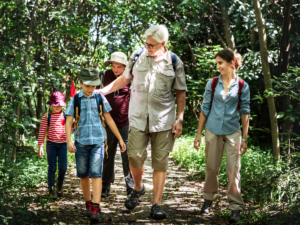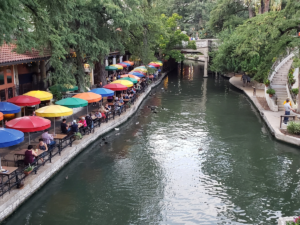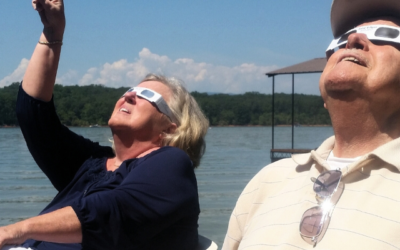Amid the hustle and bustle of modern life, where the demands of work and technology can often feel overwhelming, there is a timeless antidote to the stress and strain of our daily routines — the great outdoors. The healing power of nature, with its serene landscapes and calming influence, has been a source of solace for centuries. In today’s fast-paced world, it plays a vital role in reducing stress and enhancing overall well-being.
The Two-Hour Nature Prescription
 How long does it take to get a dose of nature high enough to make people say they feel healthy and have a strong sense of well-being? According to a study led by Mathew White of the University of Exeter, the magic number is precisely 120 minutes. This study, which surveyed 20,000 people, discovered that individuals who spent at least two hours per week in green spaces reported significantly better health and psychological well-being compared to those who did not meet this threshold.
How long does it take to get a dose of nature high enough to make people say they feel healthy and have a strong sense of well-being? According to a study led by Mathew White of the University of Exeter, the magic number is precisely 120 minutes. This study, which surveyed 20,000 people, discovered that individuals who spent at least two hours per week in green spaces reported significantly better health and psychological well-being compared to those who did not meet this threshold.
The benefits of spending time in nature extend across diverse demographics, transcending factors such as occupation, ethnicity, income, and health status. Whether you’re in a bustling urban area or a quiet rural community, nature’s restorative effects are accessible to all. These findings emphasize that integrating just two hours of nature time into your weekly routine can be a realistic and attainable goal, spread out over multiple visits if needed.
The Science Behind the Serenity
 Scientific research has uncovered the myriad ways in which nature contributes to reducing stress and promoting holistic well-being. Time spent in natural environments, provided one feels safe, acts as a potent stress antidote. The benefits of such experiences are extensive, encompassing various aspects of our physical, mental, and emotional health:
Scientific research has uncovered the myriad ways in which nature contributes to reducing stress and promoting holistic well-being. Time spent in natural environments, provided one feels safe, acts as a potent stress antidote. The benefits of such experiences are extensive, encompassing various aspects of our physical, mental, and emotional health:
- Blood Pressure and Stress Hormones: Nature time has been shown to lower blood pressure and stress hormone levels, helping individuals achieve a state of relaxation and tranquility.
- Nervous System: Exposure to natural settings reduces nervous system arousal, resulting in a calmer and more composed state of mind.
- Immune System: Nature outings have been linked to enhanced immune system function, strengthening our body’s ability to combat illnesses.
- Self-Esteem: Spending time in nature is associated with increased self-esteem and a greater sense of self-worth.
- Reduced Anxiety: Nature acts as an effective anxiety-reducer, helping individuals feel more at ease and in control.
- Improved Mood: Natural environments have a mood-lifting effect, fostering positivity and emotional well-being.
- Healing Acceleration: Natural settings have been shown to expedite the rate of physical and emotional healing.
Moreover, studies reveal that natural surroundings have the potential to mitigate Attention Deficit Disorder, reduce aggression, and alleviate feelings of isolation, especially among patients in a psychiatric setting. The innate connection between humans and the natural world appears to be a powerful source of healing, offering profound therapeutic benefits.
A Holistic Perspective on Nature
As the body of research on the healing power of nature continues to expand, it is evident that this connection goes beyond mere relaxation and stress reduction. Exposure to the natural world may have deeper implications, including a reduction in crime and aggression. Studies have suggested that greater exposure to nature correlates with higher community cohesion and substantially lower crime rates.
Interestingly, while increased vegetation might be expected to encourage crime by providing cover for criminals, research has indicated the opposite effect. Abundant vegetation is associated with a reduction in assault, robbery, and burglary, though not theft.
Although many of these findings are correlational rather than causal, there is a growing consensus that nature has a multifaceted role in promoting overall well-being. Experts have proposed a wide range of changes aimed at integrating nature into our daily lives, as a response to the increasing prevalence of smartphones and technology.
Deepening the Connection with Nature
 The renewed focus on the healing potential of nature has led to exciting developments, such as the “forest bathing” movement in Japan. This practice, which involves simply walking in the woods, is thought to boost Natural Killer (NK) cells in the immune system. NK cells play a critical role in fighting tumors and infections. A subsequent study using essential oils from cedars found that emitting these scents in a hotel room during sleep led to a significant increase in NK cells.
The renewed focus on the healing potential of nature has led to exciting developments, such as the “forest bathing” movement in Japan. This practice, which involves simply walking in the woods, is thought to boost Natural Killer (NK) cells in the immune system. NK cells play a critical role in fighting tumors and infections. A subsequent study using essential oils from cedars found that emitting these scents in a hotel room during sleep led to a significant increase in NK cells.
The future of nature therapy may lie in creating more immersive experiences. While visual engagement with nature is undoubtedly important, there is a growing emphasis on deepening our interaction with the natural world. This approach could offer a more profound connection and even greater therapeutic benefits.
Toward a Nature-Inclusive Future
As we move further into the urban century, where a significant portion of the world’s population will reside in cities by 2050, the value of nature and the consequences of its depletion are more evident than ever. Researchers, health experts, and government officials are actively considering how to integrate nature into the fabric of our daily lives. This growing body of research emphasizes the role of nature as a cornerstone of public health policy.
While there may not be an exhaustive list of “randomized, controlled studies” on the subject, the extensive epidemiological research and observations of before-and-after nature exposure highlight the robust results of interacting with the natural world.
 The global movement to reconnect with nature is a testament to its inherent value. It signifies an awakening to the myriad benefits of nature and the critical need to safeguard its existence. As we seek a path to greater livability and sustainability in our cities, the role of nature in enhancing our well-being will undoubtedly play a pivotal part.
The global movement to reconnect with nature is a testament to its inherent value. It signifies an awakening to the myriad benefits of nature and the critical need to safeguard its existence. As we seek a path to greater livability and sustainability in our cities, the role of nature in enhancing our well-being will undoubtedly play a pivotal part.
Nature is not just a pleasant backdrop to our lives; it is an essential component of our overall health and happiness. So, take a step outside, embrace the tranquility of natural settings, and immerse yourself in the healing power of the great outdoors. Nature has been our companion throughout the ages, offering solace, renewal, and serenity — an enduring source of well-being that awaits you just beyond your doorstep.




0 Comments